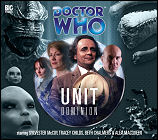 On Earth, a seashell-like organic mass appears in London, burrows its roots into the city’s power grid, and slowly begins growing in size as it feeds. UNIT has been called in to deal with it, though UNIT’s scientific advisor, Dr. Elizabeth Klein, is unable to discover much about it.
On Earth, a seashell-like organic mass appears in London, burrows its roots into the city’s power grid, and slowly begins growing in size as it feeds. UNIT has been called in to deal with it, though UNIT’s scientific advisor, Dr. Elizabeth Klein, is unable to discover much about it.
The Doctor’s TARDIS follows a telepathic trail into an alternate dimension, landing on the world of the Tolians. They, too, are dealing with a seashell-like organic mass draining their power, though this one has taken things to a more advanced stage: having brought Tolian civilization to its knees, it now drains the life force from the Tolians themselves for lack of a more potent power source. The Doctor recongizes it as an interdimensional node, but when another TARDIS materializes and a younger, more brash incarnation of the Doctor strides out, the “new” Doctor warns the seventh Doctor not to help the Tolians. The Doctor ignores the future Doctor’s warning and tries to help, only to find himself ensnared in a trap: the Tolians force the Doctor to use the interdimensional node to drain energy from other dimensions.
The Doctor and Raine escape with their lives, emerging through a dimensional gateway to Earth, where they discover that the future Doctor has been helping Klein and UNIT battle a series of alien incursions in rapid succession. Klein is less than thrilled when the “Umbrella Man” returns to her life, and UNIT’s Major Wyland is concerned that the two Doctors don’t appear to be getting along very well – the “new” Doctor seems concerned only with getting back to his TARDIS as soon as possible, and seems to have an unusual rapport with nearly every interdimensional invader to appear. The Doctor discovers, far too late, that the man claiming to be his future self is acting only in his own interests, and has already taken steps to turn Klein against him… and every living thing on Earth may pay the price.
written by Nicholas Briggs and Jason Arnopp
directed by Nicholas Briggs
music by Martin JohnsonCast: Sylvester McCoy (The Doctor), Tracey Childs (Dr. Elizabeth Klein), Beth Chalmers (Raine Creevy) Alex Macqueen (The Other Doctor), Julian Dutton (Colonel Lafayette), Bradley Gardner (Sergeant Pete Wilson), Miranda Keeling (Sylvie/Liz Morrison), Ben Porter (Private Phillips/John Starr), Sam Clemens (Major Wyland-Jones), Alex Mallinson (Private Maynard/Arunzell), Sophie Aldred (Ace)
Notes: Alex McQueen played Julius in the British political comedy The Thick Of It; fellow cast member Peter Capaldi was cast as the Doctor just a few months after the release of UNIT Dominion.
Timeline: after Animal and before the 1996 TV Movie
LogBook entry and TheatEar review by Earl Green
Review: Ever since the new TV series premiered in 2005, Big Finish has been prevented from using its characters, settings, or backstory except in the most oblique ways (i.e. so oblique that the BBC production staffers in Cardiff who vet Big Finish’s upcoming scripts don’t notice). The company’s hands have been tied by a restrictive license that draws a clear line in the sand between old (the first eight Doctors) and new (everything from Eccleston onward). UNIT: Dominion, a sprawling epic consisting of four episodes running about an hour each, gives a pretty clear indication of what Big Finish would do if it did have access to new series mythology: it would 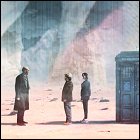 use it in suitably big-screen ways to do things that still can’t be done on TV (at least not within Doctor Who’s budget).
use it in suitably big-screen ways to do things that still can’t be done on TV (at least not within Doctor Who’s budget).
One thing UNIT: Dominion does not do is slow down to catch you up on things. This is a lavish buffet laid out for the True Fans. Why is Klein, a former Nazi time traveler (from 2001’s Colditz), now UNIT’s scientific advisor? Who is Raine Creevy? Why is Ace on Gallifrey under the tutilege of the Time Lords? The answers are spread across Big Finish’s man Doctor Who monthly range (the rewriting of Klein’s history takes place in The Architects Of History) and the Lost Stories (Raine is a new companion who would’ve been introduced in the never-made 1990 season of television Doctor Who, now brought to life in audio form as of Crime Of The Century), and you’d be well advised to have listened to those already.
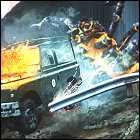 Though nominally a new extension of Big Finish’s UNIT series (which went dormant after a single “season” of four CD releases in 2004-2005), UNIT: Dominion is more Doctor Who than UNIT. Colonel Chaudhry and the other characters from the original UNIT audio series do not appear, nor are they even mentioned. The UNIT main title music is not used; the Doctor Who theme music is used instead. UNIT provides a setting and a support system, much like it did in 1970s Doctor Who; the story is about the Doctor(s), not about UNIT. The story is also about Klein, an intriguing look at her alternative existence, as well as her first realization that this existence has been arranged for her and she originally had a very different life. Tracey Childs and Alex McQueen keep much of the story afloat, since Sylvester McCoy’s availability (due to filming on The Hobbit movie trilogy) was an issue during recording. In that respect, the story is more UNIT than Doctor Who: for long stretches, the classic series Doctor whose face is on the cover artwork is barely present.
Though nominally a new extension of Big Finish’s UNIT series (which went dormant after a single “season” of four CD releases in 2004-2005), UNIT: Dominion is more Doctor Who than UNIT. Colonel Chaudhry and the other characters from the original UNIT audio series do not appear, nor are they even mentioned. The UNIT main title music is not used; the Doctor Who theme music is used instead. UNIT provides a setting and a support system, much like it did in 1970s Doctor Who; the story is about the Doctor(s), not about UNIT. The story is also about Klein, an intriguing look at her alternative existence, as well as her first realization that this existence has been arranged for her and she originally had a very different life. Tracey Childs and Alex McQueen keep much of the story afloat, since Sylvester McCoy’s availability (due to filming on The Hobbit movie trilogy) was an issue during recording. In that respect, the story is more UNIT than Doctor Who: for long stretches, the classic series Doctor whose face is on the cover artwork is barely present.
When McCoy and McQueen share the “stage”, however, it’s marvelous stuff – all of the sniping you’d expect from a collision between 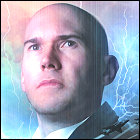 incarnations of the Doctor at wildly different points in his personal timeline. There’s also more than just a little bit of meta-commentary on the new series and its Doctors: McQueen’s unspecified future Doctor is not a million miles away from, say, David Tennant or Matt Smith, or John Simm’s gleefully unhinged take on the Master, and the seventh Doctor finds him irritating in the extreme, much like John Hurt’s Doctor was later initially annoyed at the tenth and eleventh Doctors in The Day Of The Doctor.
incarnations of the Doctor at wildly different points in his personal timeline. There’s also more than just a little bit of meta-commentary on the new series and its Doctors: McQueen’s unspecified future Doctor is not a million miles away from, say, David Tennant or Matt Smith, or John Simm’s gleefully unhinged take on the Master, and the seventh Doctor finds him irritating in the extreme, much like John Hurt’s Doctor was later initially annoyed at the tenth and eleventh Doctors in The Day Of The Doctor.
The real heart of the story, however, lies with the affable Sgt. Pete Wilson, new UNIT recruit and expectant father. It’s strongly implied that the story is set in the late 1980s or early 1990s, so Wilson can’t just whip out his cell phone and check on his wife at home. He has to sneak away and use a pay phone, and then he has to go back to battling alien menaces on an unimaginable scale. The remainder of the story’s main characters are Time Lords, or companions (former or present) of Time Lords who take this sort of thing in stride, or they’re unfathomable extradimensional beings. Wilson is the audience’s point of contact, which is why so much time is spent on him in UNIT: Dominion. This can sometimes have the effect of replicating the size of UNIT from the ’70s (we’ve gone from a Brigadier with a Captain and a Sergeant to a scientific advisor with a couple of Sergeants), but Pete Wilson is the everyman that Yates and Benton were just too unflappable to be.
There’s some very interesting stuff about the Time Lords, the Dimensioneers, and the Master arriving on Tersurus (where he was found prior to The Deadly Assassin). The concept of the 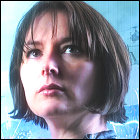 Dimensioneers in particular – a defeated former rival of the Time Lords whose powers to travel between dimensions/timelines/universes would appear to make the Time Lords look very limited at best – is intriguing, and may be setting something up for the future (although the Gallifrey audio spinoff series managed to bow out without making use of the idea).
Dimensioneers in particular – a defeated former rival of the Time Lords whose powers to travel between dimensions/timelines/universes would appear to make the Time Lords look very limited at best – is intriguing, and may be setting something up for the future (although the Gallifrey audio spinoff series managed to bow out without making use of the idea).
So you want to know what Big Finish would do with modern Doctor Who? The answer is here, and in what they’ve been doing all along: they’d put stuff in your ears that still wouldn’t fit into a TV screen on any budget.
